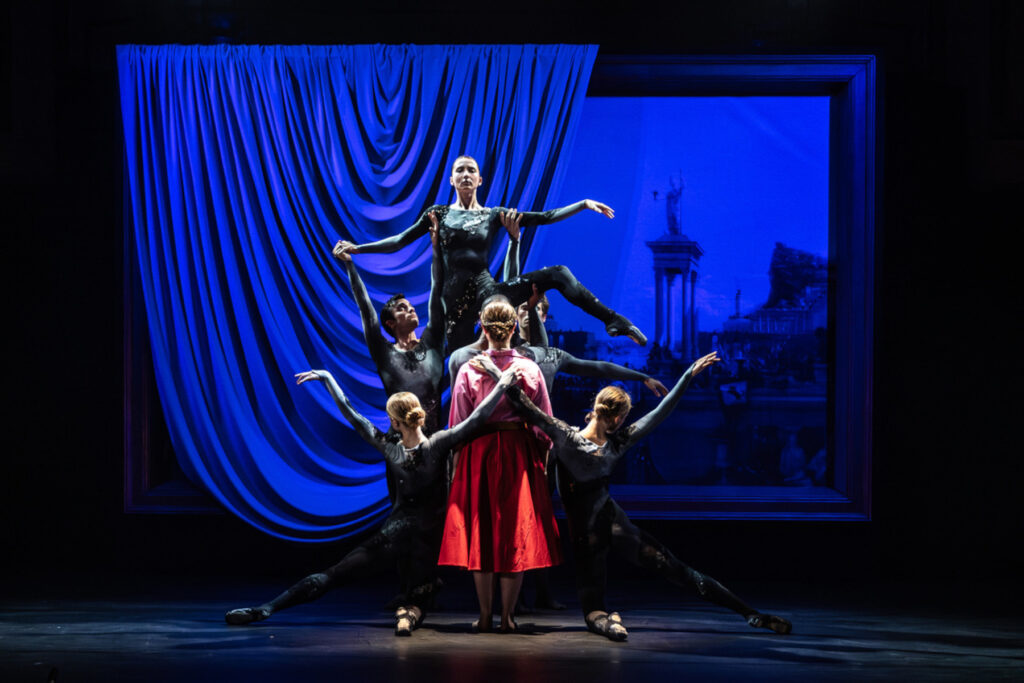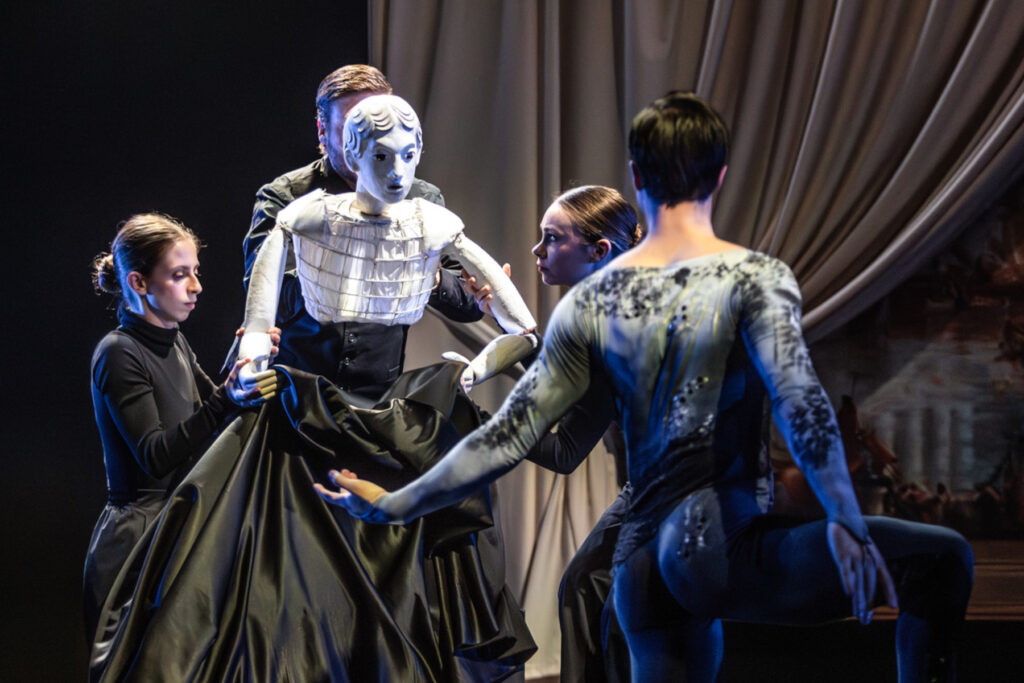Quotations about – not from – myth festoon both stage (pre-performance) and the accompanying freesheet: ‘The lover of myth is in a sense a philosopher; for myth is composed of wonders’ (Aristotle, from Metaphysics: follow this link to read the quote in context) and, ‘Myth is much more than a story. It is a way of understanding the universe’ (Joseph Conrad).
True words. One Richard Wagner knew much of this; and so did Handel and the people of his time. The Baroque Zeitgeist idealized Acadia, its stories told and retold. As myths should be.

Apollo e Dafne, HWV 122 (1710) is a dramatic cantata, not an opera, that shows how Daphne, pursued, is rescued by transformation into a tree, the setting here by director (and puppetry director for the evening) Thomas Guthrie. The reimagining of the ancient tale to modern times (and suits) is entirely believable given the plot incudes the predatory Apollo and Daphne’s need for defense and escape. However, a draped painting of Ancient Greece reminds us of the story’s origins. There are only two soloists (Dan D’Souza as Apollo and Lauren Lodge-Campbell as Dafne) but the stage was far from empty: a troupe of dancers (the simply superb New English Ballet Theatre) for one, and obbligato instruments for another, (often found on the on-stage balcony). It all worked beautifully: the oboe obbligato to Dafne’s ‘Ardi, adori, e preghi in vano’ with Leo Duarte as luxury casting for the oboist was a treat; a treat squared, at least, when joined by the second obbligato of Jane Gordon’s violin. The dancers added a whole tranche of illumination (umbrellas imaginatively imitating wheels at one point).
That particular aria of Dafne allows us to introduce Lauren Lodge-Campbell properly, voice of cleanliness and clarity. From her performance history, Lodge-Campbell specializes in the music of the Baroque (I should particularly like to have caught her in Carrissimi’s Jephtha with Les Arts Florissants and Paul Agnew in February 2024; sadly, it was held in New York!). Rightly, the contrast to Dan D’Souza’s Apollo was marked. D’Souza’s voice is strong and firm, which suits Apollo down to a tee: I was very impressed by his ENO house debut as Belcore Elisir in November last year. D’Souza had the delicacy for ‘Come rose in sula spina’ and, along with the stirring violin and bassoon obbligatos, the strength and agility for ‘Mie piante correte’. And when the two came together (the stunningly beautiful, then remarkably agile, duet, ‘Deh lascia addolcire’, the result was magic. David Bates’s tempi seemed perfect throughout (challenging, but perfect) and Valentino Zucchetti’s choreography was massively imaginative, his dancers faultless in their lithe, supple movements. All, er, illuminated by Emma Chapman’s careful lighting. A triumph.

So what to couple with Apollo e Dafne? A Pentatone release of this work coupled it, rather nicely, with another early cantata, Armida abbandonata, HWV 105, for example. Not here: The Choice of Hercules, HWV 69 (1750), a story ‘about a boy’. Puppeteers here added to the experience. The production focuses on one boy, Hercules, and how choices shape us in the world, choices between virtue and vice. The Hercules puppet was here designed and made by Ruth Paton of Mandarave Masks; it was sung by countertenor James Hall, who is possessed of the most appealing voice (and who incidentally will take on the dual role of Cake and Berghahn in Itch at OHP this summer). Hall not only projected perfectly but sang with a perfect sense of style. His crucial air, ‘Where shall I go?’ was gripping; and how La Nuova Musica created a delicate web of sound for Hercules’s phenomenally touching ‘yet can I hear that dulcet lay’. Soprano Madison Nonoa was Pleasure, her ‘Come, blooming boy’ perfect in the ease of its drooping, descending phrases. Her puppeteers for Hercules were Tabitha Bingham and Ellen Peacock.
Virtue is a lower-range role, taken by mezzo Bethany Horak-Hallet (who has previously impressed as Galatea Acis, Galatea e Polifemo with the OAE at Cadogan Hall in January 2022). Bates’s perfect pace allowed Horak-Hallet to give ‘Go assert thy heavenly race’ real gravitas. It was in the final stages of the work, from Virtue’s ‘Mount the steep ascent’ onwards, that the interactions between the two soared, Horak-Hallet’s ‘Mount, mount the step ascent authoritative, confident.
Worth the trip to deepest Shoreditch, therefore, even if the maze of its town hall seemed to bemuse all, including sometimes brusque staff. And why have the balcony so dark that pretty much everyone had to us their phone’s torch to read the seat numbers?
The music and the staging made it all worthwhile, however. Splendid.
Colin Clarke
Apollo e Dafne: Apollo – Dan D’Souza; Dafne – Lauren Lodge-Campbell
The Choice of Hercules: Hercules – James Hall; Pleasure – Madison Nonoa; Virtue – Bethany Horak-Hallet; Tabitha Bingham, Ellie Peacock, puppeteers.
Director, puppetry direction – Thomas Guthrie; Choreographer – Valentino Zucchetti; Designer – Francesco Rodriguez-Well; Lighting Director – Emma Chapman; Hair, Make-up – Tess Bevan
New English Ballet Theatre; Chorus; La Nuova Musica / David Bates (conductor).
Shoreditch Town Hall, London, 27 March 2025
Top image: Dan D’Souza (Apollo)
Photos © Craig Fuller